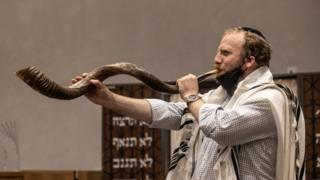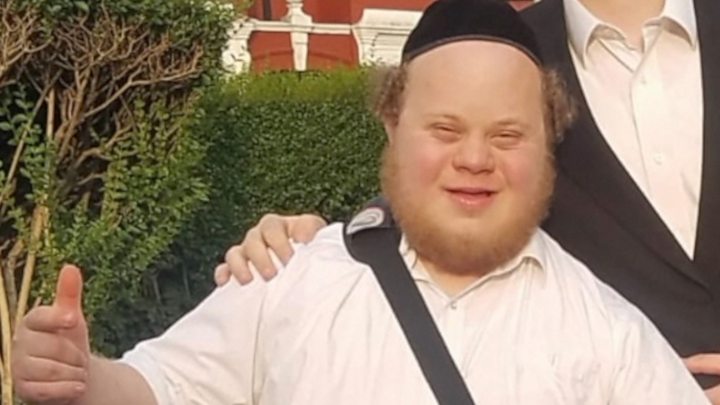 Image copyright
Marc Morris Photography
Image caption
The blowing of the Shofar - a ram's horn - is observed during Rosh Hashanah and at the end of Yom Kippur
Image copyright
Marc Morris Photography
Image caption
The blowing of the Shofar - a ram's horn - is observed during Rosh Hashanah and at the end of Yom Kippur
Jewish communities around the world will celebrate the holy festival of Rosh Hashanah this weekend. With Yom Kippur to follow on Monday week, how will the UK's new coronavirus restrictions affect Jewish celebrations?
For Dr Katrina Lester, who is due to give birth in eight weeks, this year will be a "very lonely time", spent away from relatives and the synagogue.
Like millions of others, her family has been looking forward to the High Holy Days of Rosh Hashanah - which marks the Jewish new year - and Yom Kippur - a solemn day of atonement, involving a 25-hour fast and continuous prayer throughout the day.
But this year, certain rituals and customs will have to be adapted to meet Covid-19 guidelines.
The government has issued highly detailed guidance for the Jewish community as they observe the festivals, with measures including the removal of communal items, such as prayer books, in synagogues; and the use of microphones for devotions or sermons to avoid shouting.
Image copyright Katrina Lester Image caption Katrina says it will feel "very strange" not attending synagogue this yearMedical writer Katrina, 34, her husband, 36 and their two-year-old daughter, would normally enjoy family time and lunch with her parents and her sister's household of six.
But her plans can't now happen, mainly because of new laws in England, Wales and Scotland restricting gatherings to six people.
Katrina is also being careful due to her pregnancy and a rise in cases in Hertfordshire, where she lives.
She and her husband will not go to synagogue this year either, both to avoid unnecessary contact with others and because children under the age of 12 can't attend the main services.
In keeping with their orthodox beliefs - which include not using electricity on the Sabbath or the High Holy Days of Rosh Hashanah and Yom Kippur - the family will not stream a service online.
Synagogues practising in the other branches of British Judaism, Reform and Liberal, will stream services. It means Katrina will miss out in more than one way.
"We won't be sharing meals with our family, as we would have liked to," she says, "it will be a very lonely time [for us] and for many other families".
'Power of a crowd'
For Barrister Jonny Evans, 33, the opportunities for spirituality and reflection during the High Holy Days have, in one sense, been "enhanced" by the restrictions. There are less social distractions, he says, but he will also miss his congregation.
He says while he understands why young children aren't allowed to attend mainstream services at their local synagogue, it has created "difficult" childcare issues for him and his wife, Shayna.
Image copyright Evans family Image caption Jonny Evans says he and his wife Shayna will attend separate Rosh Hashana servicesThe couple will go separately, in the hope of taking their one-year-old daughter, Lottie, to a children's service, which can take place in a socially distanced way on synagogue property, or outdoors.
On the eve of Rosh Hashanah, Jonny and his family, who live and worship in Borehamwood, in Hertfordshire, would normally go to his parents' house, where they enjoy dinner.
But these plans now won't happen, so Jonny hopes to share their meals via video call.
"My mum won't use the iPad on Rosh Hashanah," he says, "but my dad would, so she'll probably be in the background shouting."
'Less intimate'
Another person now planning a virtual dinner with family is barrister Jeremy Brier, 39, who lives in north London.
He says it will be "difficult" to recreate family moments online and he worries time will be spent focusing on IT issues rather than on the "joy of being in the same physical space and catching up" with each other.
He, his Emmerdale actress wife Louisa Clein and their three young children had hoped to eat a Rosh Hashanah meal with both sets of parents in one house, which he says "clearly isn't permissible" under the new rules.
They will now have to settle for dinner via an iPad: "Whilst it is better than nothing, it does make these occasions less intimate."
Image copyright Jeremy Brier Image caption Jeremy believes that whilst video technology is "better than nothing" it takes away from the intimacy of family timeBritain's Jewish community, which accounts for about 0.5% of the population - some 264,000 people - has suffered a high death toll during the pandemic.
After observing Passover during lockdown, the prospect of further restricted celebrations has come as an "unpleasant surprise" to many British Jews, says Richard Verber, a spokesman for the United Synagogue - which represents more than 60 British orthodox congregations.
Synagogues, like other places of worship in England, were permitted to reopen for services from 4 July, provided they follow Covid-secure guidelines.
They have implemented a string of safety measures including strict 2m social distancing, the mandatory wearing of face masks, and a ban on communal singing and sharing religious items, like prayer books.
Services can go ahead with more than six people in total, but there must not be individual groups larger than six. Many will run shortened services and have laid on extra online and face-to-face sessions to accommodate demand, requiring worshippers to book slots in advance.
'Cherished traditions'
Rabbi Helen Freeman, of the West London synagogue - the flagship congregation in the Reform movement - says her team has pulled out all the stops to be able to broadcast their services online.
The synagogue has sent out "High Holy Day at home" kits - which include individual prayer books - so people can follow the services, as well as producing CDs of choral music.
They have also given electronic tablets to congregants who want to tune in to services but don't have internet access, with IT volunteers on hand to talk them through the technology.
But while some High Holy Day rituals and customs have been easier to adapt, others simply cannot happen.

Media playback is unsupported on your device
The United Synagogue has told its rabbis and wives, or rebbetzins, that they cannot host their usual festival meals with congregants.
And while a key requirement of Rosh Hashanah services and Yom Kippur is the blowing of the Shofar, a ram's horn, the ritual will have to be modified this year.
Some are exploring the idea of blowing the shofar on synagogue sites - either indoors or outdoors - with timeslots for people to book in advance.
Despite the auspicious time of year, Rabbi Nicky Liss, of Highgate United Synagogue and chair of the organisation's Rabbinic Council, has urged congregants not to attend synagogue until they feel safe.
He says people "can still fully engage with the festival at home", despite it being "dampened" by the restrictions.
And for Jeremy, the Rosh Hashanah tradition of eating apple slices dipped in honey in the hope of a sweet new year has a particular resonance this year.
"Everyone is hoping there are better times ahead," he says.

 5 years ago
666
5 years ago
666 

